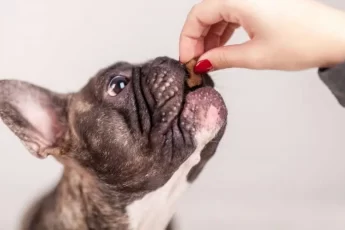Are you an avid pet lover? If so, you probably know that dogs are not just pets, they are part of the family. As a responsible dog owner, it is essential to understand that some human foods can be harmful to your furry friend’s health. Dogs have different dietary needs than humans, and certain foods that are safe for us can be toxic to them.
Chocolate is a well-known and delicious treat for humans, but it can be extremely toxic to dogs. Chocolate contains theobromine, which dogs cannot break down as efficiently as we can. Even small amounts of chocolate can cause vomiting, diarrhea, rapid breathing, increased heart rate, seizures, and, in severe cases, it can be fatal.
Grapes and raisins may seem like a healthy snack for you, but they should be kept far away from your canine companion. These fruits can cause kidney damage and even lead to kidney failure in dogs. The exact toxic substance in grapes and raisins has not been identified, but it is advisable to avoid giving these fruits to your furry friend at all costs.
Onions and garlic are commonly used in many dishes to add flavor and aroma, but they contain compounds that can cause damage to a dog’s red blood cells. If consumed in large quantities, onions and garlic can lead to anemia in canines. Symptoms may include weakness, lethargy, pale gums, and even collapse. Therefore, it is crucial to keep your dog away from these ingredients, including dishes that may contain them.
- Chocolate and Coffee
- Grapes and Raisins
- Garlic and Onions
- Avocado
- Safe Alternatives
- In Summary
- Alcohol and Yeast Dough
- Dairy Products
- Yogurt
- Cottage Cheese
- Q&A:
- Is it dangerous for dogs to eat chocolate?
- Can dogs eat grapes and raisins?
- Are onions and garlic safe for dogs to consume?
- Is it harmful for dogs to eat avocado?
Chocolate and Coffee
Chocolate and coffee are two commonly consumed foods that can be highly toxic to dogs.
Chocolate: Chocolate contains a substance called theobromine, which is toxic to dogs. Theobromine is similar to caffeine and can have a stimulating effect on dogs’ nervous systems. However, dogs process theobromine much more slowly than humans, which can lead to theobromine poisoning.
Theobromine levels vary depending on the type of chocolate. Dark chocolate and baking chocolate have higher theobromine content, making them more dangerous to dogs than milk chocolate. Signs of chocolate poisoning in dogs include vomiting, diarrhea, increased heart rate, restlessness, and in severe cases, seizures and even death.
Coffee: Coffee contains caffeine, which is also toxic to dogs. Like theobromine, dogs metabolize caffeine more slowly than humans. Even a small amount of coffee can cause caffeine poisoning in dogs, leading to symptoms such as rapid breathing, increased heart rate, restlessness, and tremors.
It’s crucial to keep chocolate and coffee products out of reach of dogs and be cautious about leaving any food or drink unattended. If you suspect your dog has consumed chocolate or coffee, contact your veterinarian immediately for guidance.
Grapes and Raisins

Grapes and raisins might seem like harmless snacks to us, but they can be extremely toxic to dogs. Even small amounts of grapes or raisins can cause serious health issues for our canine friends.
The toxic substance in grapes and raisins is still unknown, but it can cause severe kidney damage in dogs. Symptoms of grape or raisin toxicity in dogs may include vomiting, diarrhea, loss of appetite, abdominal pain, and lethargy.
If you suspect that your dog has consumed grapes or raisins, it is important to act quickly. Contact your veterinarian and provide them with information about the amount ingested and the time of ingestion. They may recommend inducing vomiting or performing other treatments to prevent further absorption of the toxic substance.
While some dogs may not show any immediate symptoms after eating grapes or raisins, it is essential to remember that the effects can be delayed. Kidney damage may not become apparent until several days after ingestion, so it’s crucial to seek veterinary attention even if your dog appears to be fine initially.
Prevention is always better than treatment when it comes to grape and raisin toxicity. Keep these fruits out of your dog’s reach and be cautious of any potential sources of grapes or raisins, including baked goods, trail mix, and some cereals. Make sure to educate yourself and your family members about the dangers of grapes and raisins for dogs.
Remember, even a small amount of grapes or raisins can be harmful to your dog. When it comes to their health, it’s best to err on the side of caution and avoid feeding them these potentially toxic foods altogether.
Garlic and Onions
Garlic and onions are commonly used in cooking and can add flavor to a wide variety of dishes. However, both garlic and onions can be toxic to dogs. They belong to the Allium family, which also includes chives, leeks, and shallots. When dogs consume these foods, it can lead to a condition called onion toxicity or garlic toxicity.
The toxic component in garlic and onions is known as N-propyl disulfide, which can cause damage to a dog’s red blood cells. This can lead to a condition called hemolytic anemia, where the red blood cells are destroyed faster than they can be replaced.
Symptoms of onion or garlic toxicity in dogs may include:
- Vomiting
- Diarrhea
- Weakness
- Difficulty breathing
- Dark urine
If you suspect that your dog has consumed garlic or onions, it is important to seek veterinary attention immediately. The vet may induce vomiting to remove the toxic substance from the dog’s system and provide supportive care to treat any symptoms or complications that arise.
It’s important to note that cooked garlic and onions are still toxic to dogs. The toxic compound in garlic and onions is not affected by cooking, so even small amounts can be dangerous. It’s best to avoid feeding your dog any foods that contain garlic or onions, such as garlic bread, onion rings, or dishes seasoned with these ingredients.
Keeping garlic and onions safely stored away from your dog’s reach can help prevent accidental ingestion. It’s also important to educate yourself about common foods that are toxic to dogs to ensure the well-being and health of your furry friend.
Avocado
Avocado is a popular and nutritious fruit, but it can be toxic to dogs. The main toxic component in avocados is called persin, which is found in the leaves, bark, seed, and even the fruit itself. Persin is safe for humans but can cause gastrointestinal upset and even pancreatitis in dogs.
The symptoms of avocado toxicity in dogs may include vomiting, diarrhea, abdominal pain, loss of appetite, and difficulty breathing. In severe cases, it can lead to death. It’s important to note that the level of toxicity can vary depending on the size and breed of the dog, as well as the amount of avocado consumed.
If you suspect that your dog has ingested avocado or is showing any symptoms of toxicity, it’s important to seek veterinary care immediately. The vet will be able to assess the situation and provide appropriate treatment. It’s also a good idea to bring a sample of the avocado or any packaging that may contain information about the variety of avocado consumed.
Safe Alternatives
If you want to share a healthy snack with your dog, there are plenty of safe alternatives to avocado. Some of the dog-friendly fruits and vegetables include:
- Blueberries: Packed with antioxidants and vitamins.
- Carrots: Crunchy and low in calories.
- Apples: A great source of fiber and vitamin C.
- Watermelon: Hydrating and refreshing.
Remember to always wash and prepare the fruits and vegetables properly before feeding them to your dog. Remove any seeds, pits, or skins that may be harmful. Additionally, it’s important to introduce new foods gradually and in moderation to prevent any digestive upset.
In Summary

While avocados are a nutritious food for humans, they should be avoided for dogs due to their potential toxicity. If you suspect your dog has ingested avocado or is showing any symptoms of toxicity, seek veterinary care immediately. There are plenty of safe alternatives to avocado that you can share with your furry friend.
Alcohol and Yeast Dough
Alcohol and yeast dough are two common foods that may seem harmless to humans, but can be toxic to dogs.
Alcohol:
Alcohol is toxic to dogs and can lead to severe consequences if ingested. Dogs are more sensitive to alcohol than humans, as their bodies cannot metabolize it as efficiently. Even a small amount of alcohol can cause symptoms such as vomiting, diarrhea, difficulty breathing, tremors, seizures, and even coma or death.
It is important to keep all alcoholic beverages and food products containing alcohol out of reach of dogs. It is also crucial to be mindful of spills or empty containers, as dogs may be attracted to the smell and taste.
Yeast Dough:
Yeast dough is another food that can be dangerous for dogs. When ingested, the warm and moist environment of a dog’s stomach can cause the dough to expand, leading to bloating and potentially dangerous levels of alcohol production. This can result in severe stomach discomfort, bloating, gas, vomiting, diarrhea, and in some cases, life-threatening stomach torsion or rupture.
It is important to keep yeast dough out of reach of dogs, and to never give them any scraps or leftovers containing yeast.
Always be aware of the foods and substances that can be toxic to dogs, and take necessary precautions to keep them safe and healthy. If you suspect your dog has ingested alcohol or yeast dough, it is important to contact your veterinarian immediately for proper guidance and treatment.
Dairy Products

Dogs are generally lactose intolerant, which means they lack the necessary enzyme to break down lactose, the sugar found in milk and other dairy products. This can lead to gastrointestinal upset, including diarrhea, vomiting, and bloating if they consume dairy.
While some dogs may be able to tolerate small amounts of dairy, it is not recommended to feed them these products. However, there are certain dairy products that are safer for dogs to consume in moderation.
Yogurt
Plain, unsweetened yogurt that does not contain any artificial additives or sweeteners can be given to dogs in small amounts. Yogurt contains live bacteria cultures that can help promote a healthy gut. It is important to choose yogurt that is free from added sugars or artificial flavorings, as these can be harmful to dogs.
Cottage Cheese

Cottage cheese is another dairy product that can be given to dogs in moderation. It is a good source of protein and calcium. However, it is important to choose plain, low-fat cottage cheese without any added salt or flavorings.
It is always best to consult with a veterinarian before introducing any new foods into your dog’s diet, including dairy products. They can provide personalized advice based on your dog’s specific needs and any potential health conditions they may have.
Q&A:
Is it dangerous for dogs to eat chocolate?
Yes, chocolate is toxic to dogs. It contains a substance called theobromine, which can be harmful to dogs and can cause symptoms such as vomiting, diarrhea, increased heart rate, seizures, and even death.
Can dogs eat grapes and raisins?
No, dogs should not eat grapes and raisins. These fruits can cause kidney failure in dogs, leading to symptoms such as vomiting, diarrhea, weakness, and increased thirst and urination.
Are onions and garlic safe for dogs to consume?
No, onions and garlic are toxic to dogs. They contain compounds that can cause damage to a dog’s red blood cells, leading to anemia. Symptoms of onion or garlic poisoning in dogs can include weakness, vomiting, and dark urine.
Is it harmful for dogs to eat avocado?
Yes, avocado can be toxic to dogs. The fruit, pit, and even the avocado plant contain a substance called persin, which can cause diarrhea, vomiting, and heart congestion in dogs. It is best to keep avocados away from dogs.








